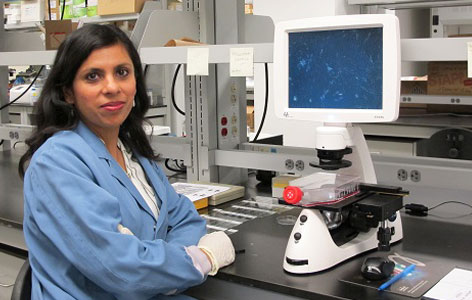
By Shabana Amanda Ali, UHN Trainee and ORT Times
Fifteen years ago, Dr. Sowmya Viswanathan wrote to Science about her dilemma in deciding whether to pursue industry or academia after earning her PhD. She is now a prominent translational scientist with academic appointments at the Krembil Research Institute and the University of Toronto, but it may surprise you to learn that she began her career in industry. In recognition of International Women’s Day this month, we caught up with Dr. Viswanathan to gain some insight on her path to success.
Q: Looking back, did you make the right career choice?
A: Absolutely. I went to industry and it allowed me to learn how to develop drug and biologic products that can actually be used clinically by patients. This has given me a huge advantage and informs my translational research. I use this along with my PhD training to develop novel cell-based therapies now, as part of my lab’s research mandate.
Q: How did you choose your area of research (or did it choose you)?
A: I chose stem cell research for graduate studies, not fully understanding what it was, and was fascinated once I understood the biology. Specifically, I was studying pluripotent embryonic stem cells which have the capacity to turn into over 200 cells in our body, and can be programmed to replace other cells. I was in a bioengineering lab where cell expansion and manufacturing was part of my training. I combined that know-how and my industry experience to develop a unique cell-therapy program in Toronto, focusing on inflammatory diseases including osteoarthritis.
Q: What are the challenges that women face in pursuing careers in academia?
A: It’s similar to the challenges women face elsewhere—balancing home life, career and personal growth. I think a women’s mentoring network is important for reinforcing positive steps and providing career advice and strategies. Having more women mentoring and being mentored at all stages of career development is critical, and we should encourage more of these opportunities at UHN and U of T.
Q: How do you maintain work-life balance (if there is such a thing)?
A: It’s certainly a challenge and one I keep adjusting and re-adjusting every day. Being a researcher is extremely demanding and requires juggling multiple activities: teaching, mentoring students, writing grants and fundraising, marketing, publishing, sitting on committees, reviewing grants, and making academic contributions at conferences and workshops. You have to stay on top of all these pressing commitments while making time for family life and events. It comes with sacrifices and compromises on my part, and that of my family too. Within this, it’s also important to carve some “me-time” from the already-squeezed days. I’ve now taken to lacing up my shoes for a lunchtime run, which energizes me and keeps me going much longer. I feel more productive, especially during those afternoons working on grants or papers and then going home to do homework with my 11-year old daughter.
Q: What is your greatest achievement of the past decade?
A: Professionally, it would be initiating and implementing Canada’s first osteoarthritis trial using mesenchymal stromal cells (MSCs), editing my first book on translational research in MSCs, and making the transition from industry to academia. Overall, having my beautiful daughter and raising her well certainly counts as my biggest accomplishment.
Q: What is your biggest goal for the next decade?
A: My goals include conducting the next successful Phase II clinical trial in osteoarthritis, getting bigger and longer-duration grants, commercializing and licensing our manufacturing technology for enhancing the potency of certain cell-based therapies, and securing an Industry or Research Chair-in cell therapy translational research.
Do you want to know how to follow in Dr. Viswanathan’s footsteps? She leaves aspiring women in research with this final sage advice: “Keep at it and don’t be afraid to fail. If you don’t try and give it all you have, you won’t know what’s possible and what’s not.”

